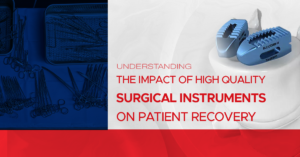The quality of surgical instruments is a cornerstone of successful patient outcomes. These instruments are not just tools but are critical components that bridge the gap between a surgical procedure and a patient’s recovery. The importance of using high-quality surgical instruments extends well beyond the operating room, influencing every aspect of the patient’s journey from surgery to recovery.
The hallmark of high-quality surgical instruments is their precision. These instruments are engineered to meet exacting standards, allowing surgeons to perform procedures with unparalleled accuracy. Precision is crucial in surgical settings, where even the smallest deviation can result in significant complications. High-quality instruments ensure that every incision, suture, and adjustment is executed with meticulous detail, minimising the risk of surgical errors and enhancing procedural efficiency. For instance, surgical scissors that are finely calibrated can make cleaner cuts, reducing tissue damage and promoting faster healing. Such precision contributes to a more controlled and predictable surgical outcome, which in turn fosters a smoother recovery process for the patient.
Durability is another critical attribute of high-quality surgical instruments. These tools are designed to endure the demands of repeated use without compromising their performance. Surgical instruments that are built to last resist wear and tear, ensuring that they function reliably throughout the procedure. This durability is essential in maintaining the safety and efficacy of surgical interventions. For example, a well-made surgical drill or laser will operate consistently, reducing the risk of malfunctions that could delay surgery or necessitate additional interventions. The reliability of high-quality instruments prevents potential disruptions during critical moments, safeguarding patient safety and enhancing overall procedural efficiency.
High-quality surgical instruments directly impact the level of surgical trauma experienced by the patient. Instruments designed with precision and care facilitate less invasive procedures, which translates into reduced trauma to surrounding tissues. Minimising surgical trauma is vital for a number of reasons: it reduces postoperative pain, lowers the risk of infections, and speeds up the healing process. For instance, advanced endoscopic instruments enable minimally invasive surgeries that involve smaller incisions, leading to less postoperative pain and quicker recovery times. The ability to perform surgeries with minimal disruption to the body’s natural structures not only enhances patient comfort but also accelerates the overall healing process.
The commitment to high-quality surgical instruments is reflected in the rigorous quality control measures implemented during their manufacturing. These instruments undergo stringent testing and inspection to ensure they meet international standards and certifications, such as Indian FDA, ISO 13485, CE marking, US FDA, and WHO-GMP. Such certifications are indicative of the instruments’ compliance with global safety and efficacy standards. Quality control processes include thorough evaluations of the instruments’ functionality, durability, and safety. For example, the calibration of surgical lasers is meticulously checked to ensure precision in cutting and coagulation, thereby minimising risks and enhancing the quality of surgical outcomes.
The use of superior surgical instruments not only improves surgical outcomes but also strengthens the trust and satisfaction of patients. When healthcare providers invest in high-quality tools, they demonstrate a commitment to delivering the best possible care. Patients who experience fewer complications and faster recoveries are likely to have a more positive perception of their care and the healthcare system as a whole. This positive experience fosters greater trust in medical professionals and promotes adherence to postoperative care instructions, further enhancing recovery.
The benefits of using high-quality surgical instruments extend beyond immediate surgical outcomes. By reducing the likelihood of complications and promoting faster recovery, these instruments contribute to long-term health benefits for patients. Faster recovery times mean patients can return to their daily lives more quickly, reducing the overall impact of surgery on their quality of life. Additionally, minimising the risk of complications can lead to fewer follow-up procedures and reduced healthcare costs over time.
Therefore, the impact of high-quality surgical instruments on patient recovery is profound and multifaceted. From their precision and durability to their role in reducing surgical trauma and enhancing patient satisfaction, these instruments are integral to achieving successful surgical outcomes. By investing in superior tools and adhering to rigorous quality control standards, healthcare providers can significantly improve patient recovery, foster trust, and contribute to the overall effectiveness of medical care. The commitment to excellence in surgical instrument manufacturing is not just a technical necessity but a fundamental aspect of delivering outstanding patient care and optimising recovery outcomes.
visit our website now now to know more.

